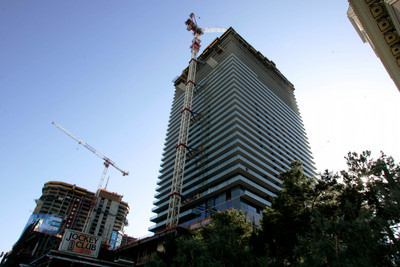Upset condo buyers want cash returned
A few Cosmopolitan condominium buyers who signed contracts as long as 31/2 years ago have been asking representatives of the Strip development to return their deposits after learning the project won't be completed until the second quarter of 2010.
No estimated closing date was ever given, however, on a series of signed purchase and sale agreements. Also, the agreements say the seller is "not liable for delays" and any "delays will not permit buyer to cancel, amend or diminish any of the buyer's obligations."
Bill Lackey, a former real estate agent from California, said he began asking for his money back a few months ago when it became apparent the project would not be completed for a couple of years.
He points to an April 14, 2005, property report that reads, "The delivery of the deed is estimated to be on or before January 2009."
"By the time they're projecting that they're even going to attempt to complete it, in pretty vague terms, the money will have been sitting (in escrow) for five years," said Lackey, who put in nearly $140,000 in deposit money in May 2005. "I thought now that the developer has put into writing that the project wouldn't be ready until 2010, he's admitting he's in default."
Lackey is referring to a letter sent in early September by recently hired Cosmopolitan developer Related Cos.
The letter, sent to contract holders on nearly 1,825 units, said: "We anticipate unit closings to begin by the second quarter of 2010."
In letters to Lackey, Cosmopolitan attorneys say the project "is continuing and making significant progress" and the "seller has no intention of terminating the agreement or returning deposits."
"We ... find no default by seller of any terms and conditions of the agreement," read a letter dated July 22.
Another buyer, who declined to let his name be used but provided a copy of his contract, put down nearly $180,000 for an upper floor condo in April 2005 when the project was being built by New York-based real estate developer Bruce Eichner.
Eichner lost control earlier this year when a syndicate of banks led by Deutsche Bank took over the project after Eichner defaulted on a $760 million in construction loans.
The buyer said he wants out of the project because he is unsure about when it will be completed and who will own it in the end.
Related Cos. Executive Vice President Ron Wackrow said a condo-hotel operator should be secured within the next 45 to 60 days.
"We understand that many buyers are interested to know who the hotel operator will be," Wackrow said. "The Cosmopolitan has always been a condo-hotel project and our buyers can be assured that will not change."
Lawyers for the Cosmopolitan declined to comment on the contracts. A call to the listed real estate agent on the contract was not returned.
Lackey and the other buyer expressed concern that Eichner used the money held in escrow, estimated to exceed $25 million, to pay for construction.
Deutsche Bank Vice President of Media Relations John Gallagher said that none of the money was used and "all buyer deposits are currently in escrow at First American Title Company."
Some buyers didn't wait for the banks to take over the project.
California residents Dennis and Linda Wood sued in Nevada federal court in January seeking to void their contract . They alleged the units were to be delivered earlier this year.
The Woods, who did not respond to an interview request left with their attorney, deposited $206,800 between February 2005 and April 2005 believing the units would be ready early this year, according to the lawsuit.
Although the lawsuit admits no estimated closing date was given, a series of statements and brochures dating back to November 2004 are cited as saying the Cosmopolitan was "projected to ... open in late 2007 and early 2008."
Eichner then announced in early 2007 that the project wouldn't be completed until late 2009, according to the lawsuit.
The lawsuit alleges that Eichner knew the project wouldn't be completed by early 2008 by the time the Woods signed their purchase and sale agreement in May 2005.
Nancy Rapoport, a law professor at the William S. Boyd School of Law at the University of Nevada, Las Vegas, said the courts could decide a reasonable closing date was implied even though the purchase and sale agreements lacked a hard closing date. This could allow earlier statements and documents to be entered as evidence.
"Under certain circumstances, and the notable one here is (that) they could argue fraud, you might be able to get in those earlier documents," Rapoport said.
Contact reporter Arnold M. Knightly at aknightly@reviewjournal.com or 702-477-3893.

















